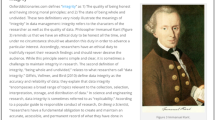Abstract
This paper describes the author’s experience of infusing an introductory database course with privacy content, and the on-going project entitled Integrating Ethics Into the Database Curriculum, that evolved from that experience. The project, which has received funding from the National Science Foundation, involves the creation of a set of privacy modules that can be implemented systematically by database educators throughout the database design thread of an undergraduate course.
Similar content being viewed by others
References
Moor, J. (1997) Towards a Theory of Privacy in the Information Age, Computers and Society, Vol.27, No. 3.
http://www.epic.org/privacy/survey/default.html (2004).
Appel, F. (1997) More on C. S. Curriculum, Forum, Communications of the ACM, Volume 40, Issue 9.
Lickona, T. (1980) What Does Moral Psychology Have to Say to the Teacher of Ethics?, Ethics Teaching in Higher Education, Callahan, D. and Bok, S. eds., Plenum Press, New York.
Davis, M. (1999) Ethics and the University, Routledge Press, New York.
Appel, F. (1998) Including the Social and Ethical Implications of Computing in the Computer Science Curriculum, Proceedings of the Ethics and Social Impact Component on Shaping Policy in the Information Age, Volume 28, Issue 2.
Wahl, N. (1999) YAATCE—Yet Another Approach To Teaching Computer Ethics, ACM SIGCSE Bulletin, The Proceedings of the Thirtieth SIGCSE Technical Symposium On Computer Science Education.
Werth, L. (1997) Getting Started with Computer Ethics, Proceedings of the Twenty-eighth SIGCSE Technical Symposium on Computer Science Education.
Tavani, H. (2001) Cyberethics Biliography 2001: A Select List of Recent Works, Computers and Society, Volume 31, Issue 2.
Tavani, H. (1999) SIGCAS at 30: Computer Ethics Textbooks: A Thirty-year Retrospective, Computers and Society, Volume 29, Issue 3.
Joint Task Force on Computing Curricula: IEEE Computer Society, Association for Computing Machinery (2001) Computing Curricula, IEEE Computer Society.
Martin, D. (1999) From Awareness to Responsible Action (part 2): Developing a Curriculum with Progressive Integration of Ethics and Social Impact, SIGCSE Bulletin, Volume 31, Issue 4.
Martin, D., Huff, C., Gotterbarn, D., Miller, K. (1996) Implementing a Tenth Strand in the CS Curriculum, Communications of the ACM, Volume 39, Issue 12.
Martin, D. & Weltz, E. (1999) From Awareness To Action: Integrating Ethics and Social Responsibility into the Computer Science Curriculum, Computers and Society, Vol. 29, Issue 2.
Johnson, D. (2001) Computer Ethics, Prentice Hall.
Davis, M. (1990) Who Can Teach Workplace Ethics? Teaching Philosophy, Vol. 13, No. 1.
Boylan, M. and Donahue, J. (2003) Ethics Across the Curriculum, Lexington Books, Maryland.
Rest, J. (1988) Can Ethics Be Taught In Professional Schools? The Psychological Research, Ethics: Easier Said Than Done, Vol. 1, No. 1, pp. 22–26.
Gotterbarn, D. (1999) Integration of Computer Ethics into the CS Curriculum: Attachment or Synthesis, SIGCSE Bulletin, Vol. 31, No. 4.
Ramakrishnan R. and Gehrke, J. (2003). Database Management Systems, 3rd edition, McGraw Hill.
Bebeau, M. (1993) Designing an OUtcome-based Ethics Curriculum for Professional Education: strategies and evidence of effectiveness, Journal of Moral Education, Vol. 22, No. 3.
Rest, J., Narvaez, D., Bebeau, M. and Thomas, S. (1999) Postconventional Moral Thinking: A Neo-Kohlbergian Approach, Leonard Erlbaum Associates, NJ.
Staehr, L. and Byrne, G. (2001) Using the Defining Issues Test for Computer Ethics Teaching, Proceedings of EthiComp 2001, Gdansk, Poland.
Author information
Authors and Affiliations
Corresponding author
Rights and permissions
About this article
Cite this article
Appel, F. Ethics across the computer science curriculum: Privacy modules in an introductory database course. SCI ENG ETHICS 11, 635–644 (2005). https://doi.org/10.1007/s11948-005-0031-2
Issue Date:
DOI: https://doi.org/10.1007/s11948-005-0031-2




